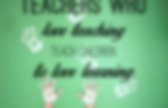

Ruairi O'Connor
Special Education Teacher
Blogs. Numberphile - Videos about Numbers and Stuff. Popplet. Plickers - Clickers, Simplified. Game-based blended learning & classroom response system. Socrative. Welcome to Flubaroo. Wolfram Problem Generator: Online Practice Questions & Answers. RubiStar Home. Assessment and Rubrics.
Polyhedra Models. WebMath - Solve Your Math Problem. Common Symbols in Mathematics. Map Skills for Elementary Students. This website would like to remind you: Your browser (Firefox 17) is out of date.
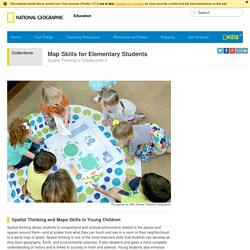
Update your browser for more security, comfort and the best experience on this site. Photograph by Winn Brewer, National Geographic Spatial Thinking and Maps Skills in Young Children Spatial thinking allows students to comprehend and analyze phenomena related to the places and spaces around them—and at scales from what they can touch and see in a room or their neighborhood to a world map or globe.
Spatial thinking is one of the most important skills that students can develop as they learn geography, Earth, and environmental sciences. Complex Numbers Calculator. Step into 2nd Grade with Mrs. Lemons. Suggestions for Writing Your Own Educational Philosophy. You will be required to submit an up-to-date philosophy with your student teaching application; many districts require applicants to submit a philosophy along with other material.
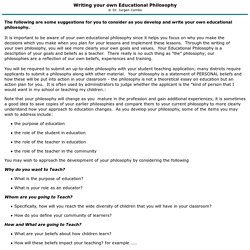
Your philosophy is a statement of PERSONAL beliefs and how these will be put into action in your classroom - the philosophy is not a theoretical essay on education but an action plan for you. It is often used by administrators to judge whether the applicant is the "kind of person that I would want in my school or teaching my children.: Note that your philosophy will change as you mature in the profession and gain additional experiences; it is sometimes a good idea to save copies of your earlier philosophies and compare them to your current philosophy to more clearly understand how your approach to education changes.
The purpose of education the role of the student in education the role of the teacher in education the role of the teacher in the community. Literacy Stop. Digital textbooks and standards-aligned educational resources. Differentiation Station. Techie ThrowDown 2015 - Symbaloo. K-12 Education Tips & Strategies That Work. Myth-Busting Differentiated Instruction: 3 Myths and 3 Truths. In third grade, my daughter struggled with problems like 36 x 12, and she knew her multiplication facts.
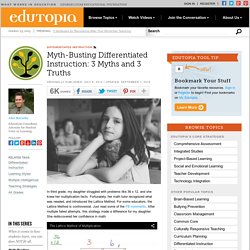
Fortunately, her math tutor recognized what was needed, and introduced the Lattice Method. For some educators, the Lattice Method is controversial. Technology Knowledge Base. The Best Interactive Web Tools for Educators. Most of us are working at full capacity, and keeping up with technology can feel like one more chore on the to-do list. Still, learning your way around a few of the best Web tools is worth your time. Innovative teachers are frequently using intuitive programs and websites that are easy to learn. These web tool can save you a lot of daily hassles that you might not even realize you have been tolerating. Whether you want to move the class newsletter online or try out a flipped classroom, we’re sharing the best sites to do it. Sharing and Collaborating The Internet was invented to foster communication. Free Technology for Teachers.
Printable Worksheets, Online Games, and More. 101 Web 2.0 Teaching Tools. Online tools and resources have made it easier for teachers to instruct students, and for students to collaborate with those teachers and with other students and parents.
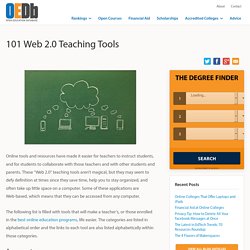
These “Web 2.0” teaching tools aren’t magical, but they may seem to defy definition at times since they save time, help you to stay organized, and often take up little space on a computer. Some of these applications are Web-based, which means that they can be accessed from any computer. The following list is filled with tools that will make a teacher’s, or those enrolled in the best online education programs, life easier. The categories are listed in alphabetical order and the links to each tool are also listed alphabetically within those categories. Top 10 Sites for Educational Games. There's no denying the appeal that online games have for kids.
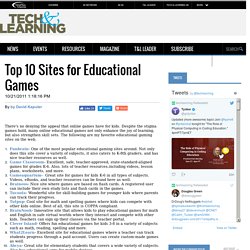
Despite the stigma games hold, many online educational games not only enhance the joy of learning, but also strengthen skill sets. The following are my favorite educational gaming sites on the web. Funbrain- One of the most popular educational gaming sites around. Not only does this site cover a variety of subjects, it also caters to K-8th graders, and has nice teacher resources as well.Game Classroom- Excellent, safe, teacher-approved, state-standard-aligned games for grades K-6. Also, lots of teacher resources,including videos, lesson plans, worksheets, and more.Gameaquarium- Great site for games for kids K-6 in all types of subjects.
8 Technologies That Will Shape Future Classrooms. What does the future of learning hold?
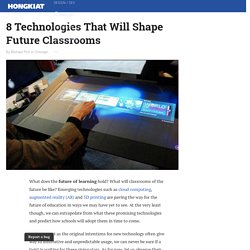
What will classrooms of the future be like? Emerging technologies such as cloud computing, augmented reality (AR) and 3D printing are paving the way for the future of education in ways we may have yet to see. Engaging Learners With Feedback and Collaborative Learning Environments Registration. Intelligence Squared debate: Don’t end the tyranny of the test. On Thursday I spoke at an Intelligence Squared debate called ‘Let’s end the tyranny of the test: relentless school testing demeans education’.
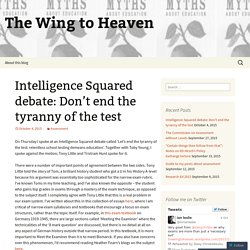
Together with Toby Young, I spoke against the motion; Tony Little and Tristram Hunt spoke for it. There were a number of important points of agreement between the two sides. Tony Little told the story of Tom, a brilliant history student who got a U in his History A-level because his argument was essentially too sophisticated for the narrow exam rubric. I’ve known Toms in my time teaching, and I’ve also known the opposite – the student who gains top grades in exams through a mastery of the exam technique, as opposed to the subject itself.